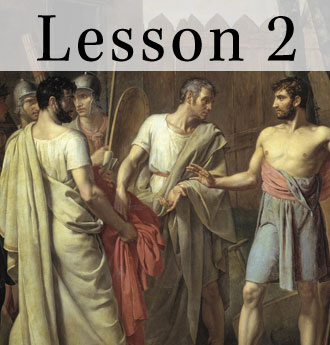The Resource Center » Level 3 » Unit 1 »
Lesson 2: What Ideas about Civic Life Informed the Founding Generation?

Lesson Purpose
Lesson Objectives
- describe how and why natural rights philosophy differs from classical republicanism and how both systems of thought influenced the founding generation in America,
- explain the kinds of challenges that a society faces when it strives to preserve the rights to life, liberty, property, and “the pursuit of happiness” while at the same time promoting the common good and civic virtue, and
- evaluate, take, and defend positions on the importance of civic virtue today and the role of political philosophy in thinking about government.
Lesson Terms
Lesson Biographies
Lesson Court Cases
Case Summary
In 1841, Rhode Island was still operating under an archaic system of government established by a royal charter of 1663. The charter strictly limited suffrage and made no provision for amendment. Dissident groups, protesting the charter, held a popular convention to draft a new constitution and to elect a governor. The old charter government declared martial law and put down the rebellion, although no federal troops were sent. One of the insurgents, Martin Luther, brought suit claiming the old government was not "a republican form of government" and all its acts were thereby invalid.
Question(s)
Did the Court have the constitutional authority to declare which group constituted the official government of Rhode Island?
Answer(s)
No. The Court held that "the power of determining that a state government has been lawfully established" did not belong to federal courts, and that it was not the function of such courts to prescribe the qualifications for voting in the states. The Court held that the creation of republican forms of government and the control of domestic violence were matters of an essentially political nature committed by the Constitution to the other branches of government. Hence, the Court should defer to Congress and the president when confronted with such issues.
Lesson Primary Sources
Believed to be written and delivered en route to Massachusetts, Rev. Winthrop, who would be the first governor of the Masachusetts Bay Colony, warned his Puritan colonists that their new community would be a "city upon a hill," watched by the world and must therefore keep their community strong in faith and thrive against the hardships of their new and untamed land.






